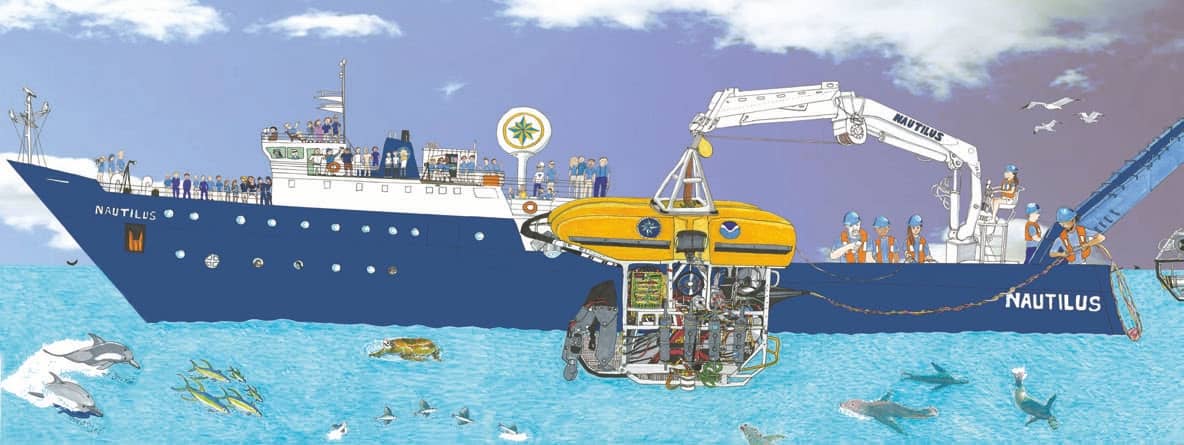Artists At Sea
Muse Science Magazine for Kids
|January 2020
ILLUMINATING THE MYSTERIES OF OCEAN SCIENCE

At the Georgia Museum of Art, visitors can experience being submerged in the deep sea.
The large installation thereby artist and ocean explorer Rebecca Rutstein has steel hexagonal shapes inspired by hydrocarbon structures found in the Guaymas Basin in the Gulf of California. Rutstein explored the basin with marine scientist Samantha Joye. LED lights change as visitors move through the space. These changing, shimmering lights represent the siphonophore, a bioluminescent organism that separates when disturbed, creating flashes of light that can be seen when entering the water column during the more than 7,000-foot (2,200-m) descent into the deep sea.
Very few people will experience this type of bioluminescence in real life, and that’s exactly why Rutstein created the installation. “I’m trying to share places and processes hidden from view to connect people with the beauty [and] complexity of the deep ocean,” she says.

Exploring New Frontiers
For centuries, artists have accompanied explorers to depict new discoveries. When the famed Captain Cook traveled to the Pacific Ocean in the late 1700s, for instance, he brought along several artists. Some sacrificed their lives in their quest to visually represent a world few from home would ever see.
As scientists explore a new frontier today—the deep ocean—many are bringing artists working in a variety of media to visually interpret and share their findings.
Rutstein is one of many artists to explore the ocean with scientists. In addition to working with Joye, she has explored the deep sea with the Ocean Exploration Trust’s Science Communication Fellow program aboard the Exploration Vehicle (E/V)
This story is from the January 2020 edition of Muse Science Magazine for Kids.
Subscribe to Magzter GOLD to access thousands of curated premium stories, and 10,000+ magazines and newspapers.
Already a subscriber? Sign In
MORE STORIES FROM Muse Science Magazine for Kids

Muse Science Magazine for Kids
ANIMAL FIREFIGHTER TO THE RESCUE
Can animals help manage the risks of deadly wildfires?
3 mins
Muse July 2025: The Story Behind Wildfires

Muse Science Magazine for Kids
FIRE DANGER
WHY THE RISK OF WILDFIRES KEEPS GROWING
4 mins
Muse July 2025: The Story Behind Wildfires

Muse Science Magazine for Kids
The Miller NEW Normal
WHAT TODAY’S WILDFIRES TELL US ABOUT OUR FUTURE
8 mins
Muse July 2025: The Story Behind Wildfires

Muse Science Magazine for Kids
WOMEN AND FIREFIGHTING: A GOOD FIT
Jessica Gardetto is a firefighter. Her father was, too. “I grew up with my dad coming home smelling like wildfire and covered in soot,” she says.
1 min
Muse July 2025: The Story Behind Wildfires

Muse Science Magazine for Kids
What is happening on your fingertips when they get all wrinkly in a hot tub?
—Felix G., age 10, Montana
1 mins
Muse July 2025: The Story Behind Wildfires

Muse Science Magazine for Kids
WHEN the SMOKE CLEARS
THE LINGERING EFFECTS OF THE RECENT PACIFIC PALISADES AND ALTADENA EATON FIRES
6 mins
Muse July 2025: The Story Behind Wildfires

Muse Science Magazine for Kids
PICKING TEAMS
Keep it fair with a strategy that relies on geometry.
2 mins
Muse July 2025: The Story Behind Wildfires

Muse Science Magazine for Kids
SHAN CAMMACK
WILDLIFE BIOLOGIST AND FIRE SAFETY OFFICER
3 mins
Muse July 2025: The Story Behind Wildfires

Muse Science Magazine for Kids
Scientists Create Mice With Woolly Mammoth-Like Fur
RESEARCHERS AT A COMPANY IN TEXAS ARE WORKING TO CREATE A LIVING ANIMAL THAT RESEMBLES THE EXTINCT WOOLLY MAMMOTH. Recently, they produced mice with traits of the large mammal. The mice all have coats with mammoth-like fur, and some of the small mammals also have genes that help them store fat. Both features would help the animals survive in the cold Arctic, where the woolly mammoth once lived.
1 min
Muse July 2025: The Story Behind Wildfires

Muse Science Magazine for Kids
Cool Sunshade Added to the Nancy Roman Space Telescope
THE NANCY ROMAN SPACE TELESCOPE IS A NEW TELESCOPE THAT NASA IS BUILDING AND WILL LAUNCH INTO SPACE, LIKELY IN EARLY 2027.
1 min
Muse July 2025: The Story Behind Wildfires
Translate
Change font size

